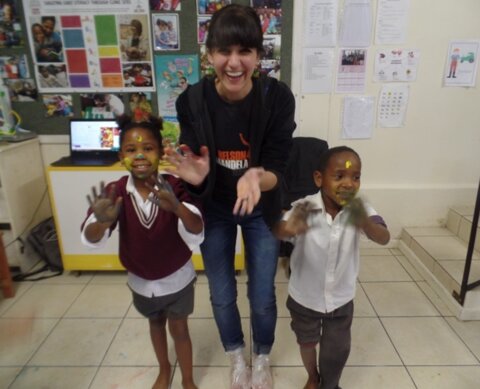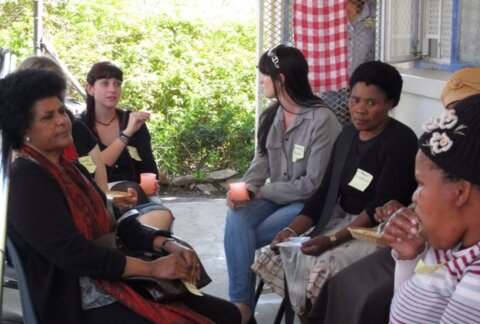Meet the Qualitative Researchers: Sharli Paphitis
Dr Sharli Paphitis is a philosopher and qualitative researcher who currently works with the NIHR Global Health Research Group on packages of care for mental health for survivors of violence in Low and Middle Income Countries. Below, she discusses the role of storytelling and laughter in qualitative research and her passion for Community-Based Participatory Research.
Q: Why do you do qualitative research?
Sharli: At the heart of qualitative research is a core human activity: storytelling. In qualitative research storytelling involves not only the eliciting of stories from people, but engaging with those narratives through deep listening.
For me, the imaginative and moral possibilities of qualitative research are illuminated when we see it in this fundamentally narrative way. By inviting participants, researchers and broader audiences to engage with diverse narratives, we allow people to develop their moral imagination through putting themselves in the shoes of somebody very different from themselves.
I think the important thing qualitative research allows us to do is to ‘try on’ and understand different perspectives, and in so doing, it helps us both to understand our place in the world more broadly and to avoid constructing crude one-sided pictures of phenomena.

Q: How would you characterise your approach to qualitative research?
Sharli: Qualitative research invites us to challenge the traditional relationship between researchers and the subjects of research. Taking up this invitation, as well as through the influence of my early career work in South Africa, my orientation and approach to qualitative research has largely been rooted in collaboration and participation. A collaborative and participatory approach has epistemic and social justice aims: seeking to address social challenges identified by participants through a collaborative research process, and seeking to share the power inherent in the knowledge-generation process with participants.
From this perspective the relationship between researcher and participants is understood as relational because researchers and participants work together with one another as partners to co-investigate the research questions, co-plan the research activities, and share in the responsibility for the research dissemination. This can be a time-consuming approach that requires a high degree of flexibility and adaptability, but can be extremely rewarding if your research goal is to harness the power of people to collectively work for social change in sustainable ways.
Q: What do you think are some of the most important lessons you’ve learned in doing qualitative research?
Sharli: I think most of us come to explore social research because we care very deeply about pressing social concerns and we want to see positive social change. As we work to catalyse societal change, particularly through qualitative research processes, we as researchers come to see ourselves more clearly and recognise that we too will need some work. The critical and self-reflective process of qualitative research allows for the kind of careful and slow scholarship that I think can help us to cultivate the virtue of academic humility.
Doing qualitative research is also the best way of uncovering your own ignorance about the most basic concepts because it exposes you to the plethora of ways in which those concepts are being deployed outside of the realm of your own narrow experiences. Participants I wouldn’t have expected to be teachers have shared wisdom with me that I would never have found inside the academy. I have learned to tread lightly when claiming to know.
I have also learned to laugh. It’s difficult to imagine that Nietzsche might have something to teach us about fieldwork, but he says: “I should actually risk an order of rank among philosophers depending on the rank of their laughter – all the way up to those capable of a golden laughter” (BGE 294). I’m still working on cultivating what Nietzsche would call a Dionysian kind of laughter, but working in the field I have learned that having a good sense of humour and being able to laugh (especially at yourself) can help to build rapport across multiple barriers and ensure that everyone enjoys the process.

Q: Tell us about a piece of research you are proud of?
Sharli: One of my favourite research projects has been the Siyahluma (We are Growing) project. This was a large interdisciplinary critical public health project in South Africa. In the initial phase of the project we conducted a 16 page survey with over 1000 school-going girls in the Eastern Cape province. What our research showed was a notable lack of access to reliable information about menstruation made available to school-going girls.
More insidiously, however, accompanying this lack of information, our research highlighted a culture of silence and a network of taboos surrounding menstruation. The negative symbolic associations made with menstruation—e.g. menstruating women are dirty, impure, shameful and contaminated and so are often actively restricted from engaging in certain activities while menstruating—further compound problems that result from a lack of information or the availability of heavily stigmatised information.
In response to these research findings we designed a number of community-based education interventions. The most vibrant and exciting of these was the production of the Siya-Mensa (Celebrate Menstruation) community theatre production which we produced in partnership with a local high school drama class. The production focused on the social and economic challenges associated with menstruation, the cultural stigmas, taboos and culture of silence surrounding menstruation, as well as common myths associated with menstruation and menstrual products, all within the school environment.
Siya-mensa was performed for primary school children at mixed gender schools. After each performance the high school girls opened up a space for dialogue between the primary school audience and themselves, where the younger girls and boys were able to ask questions and talk to the older girls about menstruation, gender and sexuality (this dialogue was co-facilitated by our research group). The high school girls, through workshopping and developing the production Siya-Mensa with one another—and thereby engaging in dialogue and critical reflection on the issues surrounding menstruation that they themselves have encountered and experienced across racial, religious and socio-economic lines—increased their own knowledge of menstruation and the menstruation-related challenges facing South African school-going girls.
In the post-performance dialogue the audience (primary school children) were given the chance to critically engage with what they saw by entering into a dialogue with actors (the high school girls), to reflect on their responses, and debate their views with other audience members and responders.
What I took away from my experience of working in community theatre is that it can assist with common challenges surrounding the inaccessibility of information in communities by harnessing the power of individual and collaborative storytelling.
Q: Favourite blog?
Sharli: I don’t read many blogs, but one blog that I do follow is by Helen Kara. Her insightful and honest writing covers diverse topics that will often be of interest to qualitative researchers and she has been particularly active in writing invaluable content on research during the COVID-19 pandemic. She recently gave away her latest research methods book via her blog!
Sharli is particularly interested in how philosophy and qualitative research can be brought together to inform interventions. You can read more about her work bringing existential phenomenology together with qualitative studies to build a framework for menstruation interventions and advocacy (linked here) and the different studies that she has worked on in the links below. Sharli is based within the Section of Women's Mental Health, IoPPN (Sharli's KCL profile).